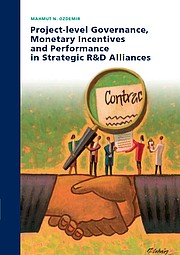Project-level Governance, Monetary Incentives, and Performance in Strategic R&D Alliances Defended on Tuesday, 21 June 2011
A growing number of firms rely on strategic R&D alliances to develop new products. In these alliances, firms use various kinds of governance mechanisms for incentive alignment. Project-level governance, i.e., the daily control of alliance activities by firms’ alliance representatives such as steering committee members, alliance managers, and project managers; and, performance-based monetary incentives, i.e., the potential milestone payments tied to the performance of partners, are two governance mechanisms, increasingly used in practice, yet overlooked in the strategic alliances literature. In this dissertation, I examine the antecedents and performance outcomes of these two governance mechanisms in the biopharmaceutical industry setting.
The results of this dissertation suggest that project-level governance and monetary incentives offset each others’ effects on alliance innovation performance in the context of startup-incumbent alliances. In other words, offering greater monetary incentives to startups has minimal positive effect on development success, if incumbents opt for intense project-level governance by their controllers at the same time. On the other hand, the results suggest that greater monetary incentives result in higher abnormal stock returns to startup firms following alliance announcements. The results also reveal the positive reciprocal relationship between project-level governance and monetary incentives. The greater the project-level governance, the higher the size of potential milestone-payments, and vice versa. Hence, the incumbents that exercise intense governance on startups in alliances offer also higher potential milestone payments to compensate for the performance risks of startups. The results also show that project-level governance positively influences the contractual detail, which in turn increases the likelihood of development success. Finally, the results reveal several other exogenous and endogenous antecedents of both governance mechanisms.
Keywords
technological innovations, new product development, strategic alliances, contracts, potential milestone payments, inter-firm teams, alliance steering committees, alliance managers, agency theory, risk-taking, pharmaceutical industry, biotechnology











